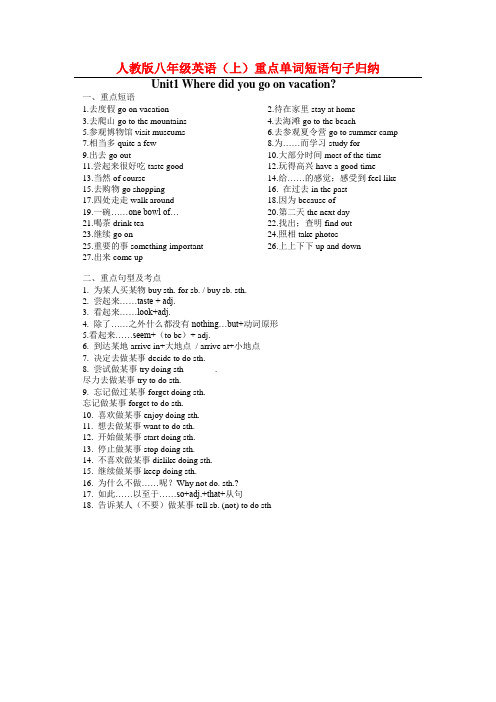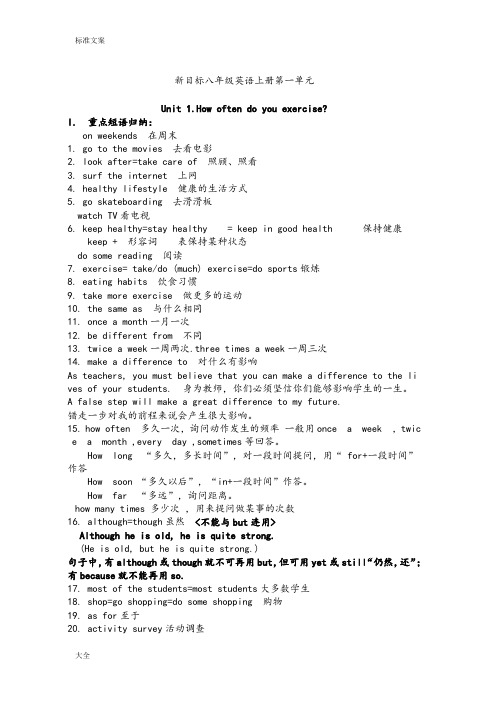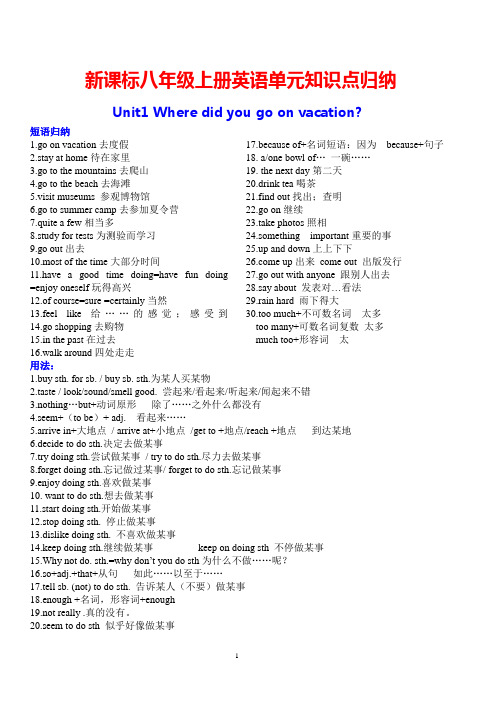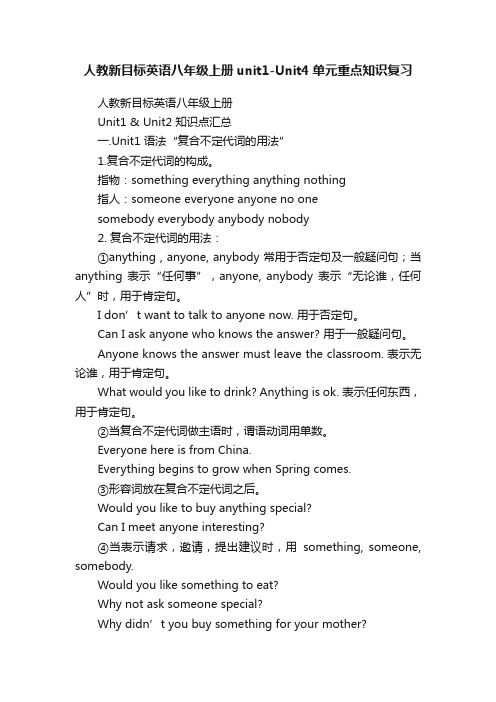人教版新目标八年级英语上册1-4单元知识点总结
- 格式:doc
- 大小:115.00 KB
- 文档页数:24

八上U1-4知识点复习1、go on vacation vacation相当于,但vacation表示长的假期。
2、visit museums go to summer camp3、提建议的句子:①What/how about + doing sth.? ②Why don’t you + do sth. ?③Why not + do sth. ? ④Let’s + do sth. ⑤Shall we / I + do sth ?4、好久不见大多数时间 enjoyable activities5、nothing... but...意为“除...之外;只有”,如:I have nothing to do but watch TV all day long .我整天除了看电视什么也没干。
8、feel like 意为:“感受到;摸起来”,后跟宾语从句或名词、动名词。
如:I felt like I was a bird .我感觉我是一只鸟。
It feels like a stone. 它摸起来像一块石头。
feel like doing sth .意为“想做某事”。
如:I feel like .我想吃东西。
9、bored adj. ,意为“”,其主语是某人;(人ed 物ing)boring adj.,意为“”其主语是物。
如:I got with the work .我对这无聊的工作感到厌倦。
相类似的词还有:interested /tired/excited /amazing /surprisedInteresting /tiring /exciting /amazing /surprising10、decide (v)决定,名词形式是;decide on doing sth. 决定做某事decide to (not )do sth.=make a decision (not )to do sth. 决定做/不做某事11、enough 足够的(置于前后)如:I have enough money to go to Beijing.我有足够的钱去北京。

人教版八年级英语(上)重点单词短语句子归纳Unit1 Where did you go on vacation?一、重点短语1.去度假go on vacation2.待在家里stay at home3.去爬山go to the mountains4.去海滩go to the beach5.参观博物馆visit museums6.去参观夏令营go to summer camp7.相当多quite a few8.为……而学习study for9.出去go out 10.大部分时间most of the time 11.尝起来很好吃taste good 12.玩得高兴have a good time13.当然of course 14.给……的感觉;感受到feel like 15.去购物go shopping 16. 在过去in the past17.四处走走walk around 18.因为because of19.一碗……one bowl of… 20.第二天the next day21.喝茶drink tea 22.找出;查明find out23.继续go on 24.照相take photos25.重要的事something important 26.上上下下up and down27.出来come up二、重点句型及考点1. 为某人买某物buy sth. for sb. / buy sb. sth.2. 尝起来……taste + adj.3. 看起来……look+adj.4. 除了……之外什么都没有nothing…but+动词原形5.看起来……seem+(to be)+ adj.6. 到达某地arrive in+大地点/ arrive at+小地点7. 决定去做某事decide to do sth.8. 尝试做某事try doing sth .尽力去做某事try to do sth.9. 忘记做过某事forget doing sth.忘记做某事forget to do sth.10. 喜欢做某事enjoy doing sth.11. 想去做某事want to do sth.12. 开始做某事start doing sth.13. 停止做某事stop doing sth.14. 不喜欢做某事dislike doing sth.15. 继续做某事keep doing sth.16. 为什么不做……呢?Why not do. sth.?17. 如此……以至于……so+adj.+that+从句18. 告诉某人(不要)做某事tell sb. (not) to do sthUnit 2 How often do you exercise?一、根据汉语写短语。

新目标八年级英语上册第一单元Unit 1.How often do you exercise?I. 重点短语归纳:on weekends 在周末1. go to the movies 去看电影2. look after=take care of 照顾、照看3. surf the internet 上网4. healthy lifestyle 健康的生活方式5. go skateboarding 去滑滑板watch TV看电视6. keep healthy=stay healthy = keep in good health 保持健康keep + 形容词表保持某种状态do some reading 阅读7. exercise= take/do (much) exercise=do sports锻炼8. eating habits 饮食习惯9. take more exercise 做更多的运动10. the same as 与什么相同11. once a month一月一次12. be different from 不同13. twice a week一周两次.three times a week一周三次14. make a difference to 对什么有影响As teachers, you must believe that you can make a difference to the li ves of your students. 身为教师,你们必须坚信你们能够影响学生的一生。
A false step will make a great difference to my future.错走一步对我的前程来说会产生很大影响。
15.how often 多久一次,询问动作发生的频率一般用once a week ,twice a month ,every day ,sometimes等回答。

新目标八年级英语上册第一单元Unit 1.How often do you exercise?I. 重点短语归纳:on weekends 在周末1. go to the movies 去看电影2. look after=take care of 照顾3. surf the internet 上网4. healthy lifestyle 健康的生活方式5. go skateboarding 去滑滑板watch TV看电视6. keep healthy=stay healthy = keep in good health 保持健康keep + 形容词表保持某种状态do some reading 阅读7. exercise= take/do (much) exercise=do sports锻炼8. eating habits 饮食习惯9. take more exercise 做更多的运动10. the same as 与什么相同11. once a month一月一次12. be different from 不同13. twice a week一周两次.three times a week一周三次14. make a difference to 对什么有影响As teachers, you must believe that you can make a difference to the lives of your st udents.身为教师,你们必须坚信你们能够影响学生的一生。
A false step will make a great difference to my future.错走一步对我的前程来说会产生很大影响。
15. how often 多久一次,询问动作发生的频率how many times 多少次,用来提问做某事的次数16. although=though虽然<不能与but连用>Although he is old, he is quite strong.(He is old, but he is quite strong.)句子中,有although或though就不可再用but,但可用yet或still“仍然,还”;有because就不能再用so.17. most of the students=most students大多数学生18. shop=go shopping=do some shopping 购物19. as for至于20. activity survey活动调查21. do homework做家庭作业22. do house work做家务事23. eat less meat吃更少的肉24. junk food垃圾食物25. be good for 对什么有益26. be bad for对什么有害27. want to do sth 想做某事28. want sb to do sth想某人做某事29. try to do sth 尽量做某事30. come home from school放学回家31. of course=certainly=sure当然32. get good grades取得好成绩33. some advice 一些建议some advice 中的advice 是不可数名词 a piece of advice 一则建议 give advice 提出建议take one’s advice 采纳或听从某人的建议4. help sb to do sth帮助某人做某事=help sb with sth35. a lot of vegetables=many vegetables许多蔬菜36. hardly= almost not几乎不hardly ever很少,几乎不,从不37. keep/be in good health保持健康38.your favorite program你最喜欢的节目39. Animal World 动物世界40. play soccer踢足球41.every day 每天every day 与everyday1. every day 作状语,译为“每一天”。

新课标八年级上册英语单元知识点归纳Unit1 Where did you go on vacation?短语归纳1.go on vacation去度假2.stay at home待在家里3.go to the mountains去爬山4.go to the beach去海滩5.visit museums 参观博物馆6.go to summer camp去参加夏令营7.quite a few相当多8.study for tests为测验而学习9.go out出去10.most of the time大部分时间11.have a good time doing=have fun doing =enjoy oneself玩得高兴12.of course=sure =certainly当然13.feel like给……的感觉;感受到14.go shopping去购物15.in the past在过去16.walk around四处走走17.because of+名词短语:因为because+句子18. a/one bowl of…一碗……19. the next day第二天20.drink tea喝茶21.find out找出;查明22.go on继续23.take photos照相24.something important重要的事25.up and down上上下下e up出来come out 出版发行27.go out with anyone 跟别人出去28.say about 发表对…看法29.rain hard 雨下得大30.too much+不可数名词太多too many+可数名词复数太多much too+形容词太用法:1.buy sth. for sb. / buy sb. sth.为某人买某物2.taste / look/sound/smell good. 尝起来/看起来/听起来/闻起来不错3.nothing…but+动词原形除了……之外什么都没有4.seem+(to be)+ adj. 看起来……5.arrive in+大地点/ arrive at+小地点/get to +地点/reach +地点到达某地6.decide to do sth.决定去做某事7.try doing sth.尝试做某事/ try to do sth.尽力去做某事8.forget doing sth.忘记做过某事/ forget to do sth.忘记做某事9.enjoy doing sth.喜欢做某事10. want to do sth.想去做某事11.start doing sth.开始做某事12.stop doing sth. 停止做某事13.dislike doing sth. 不喜欢做某事14.keep doing sth.继续做某事keep on doing sth 不停做某事15.Why not do. sth.=why don’t you do sth为什么不做……呢?16.so+adj.+that+从句如此……以至于……17.tell sb. (not) to do sth. 告诉某人(不要)做某事18.enough +名词,形容词+enough19.not really .真的没有。

Unit 1 How often do you exercise? ...................................................................................................... - 1 - 知识点讲解..................................................................................................................................... - 1 -1. 疑问词how 的用法....................................................................................................... - 1 -5. My mother wants me to drink it. ..................................................................................... - 1 -第1单元同步练习题..................................................................................................................... - 4 - 一.词汇. ...................................................................................................................................... - 4 - 二.单项选择。

人教新目标英语八年级上册unit1-Unit4单元重点知识复习Unit 1: Grammar - "XXX"1.n of Compound Indefinite Pronouns:XXX: something。
everything。
anything。
nothingReferring to People: XXX。
everyone。
anyone。
no one。
XXX。
everybody。
anybody。
nobodyage of Compound Indefinite Pronouns:① anything。
anyone。
anybody are often used in negative XXX。
when anything means "any matter," and anyone。
anybody means "anyone," they are used in affirmative sentences.I don't want to talk to anyone now。
(Negative sentence)Can I ask anyone who knows the answer。
(General n)XXX(Affirmative sentence)What would you like to drink。
Anything is ok。
(Affirmative sentence)② XXX subjects。
the verb must be in singular form.Everyone here is from China.XXX.③ Adjectives XXX.Would you like to buy anything special?Can XXX interesting?④ When making requests。

新目标八年级英语上册第一单元Unit 1.How often do you exercise?I. 重点短语归纳:on weekends 在周末1. go to the movies 去看电影2. look after=take care of 照顾3. surf the internet 上网4. healthy lifestyle 健康的生活方式5. go skateboarding 去滑滑板watch TV看电视6. keep healthy=stay healthy = keep in good health 保持健康keep + 形容词表保持某种状态do some reading 阅读7. exercise= take/do (much) exercise=do sports锻炼8. eating habits 饮食习惯9. take more exercise 做更多的运动10. the same as 与什么相同11. once a month一月一次12. be different from 不同13. twice a week一周两次.three times a week一周三次14. make a difference to 对什么有影响As teachers, you must believe that you can make a difference to the lives of your st udents.身为教师,你们必须坚信你们能够影响学生的一生。
A false step will make a great difference to my future.错走一步对我的前程来说会产生很大影响。
15. how often 多久一次,询问动作发生的频率how many times 多少次,用来提问做某事的次数16. although=though虽然<不能与but连用>Although he is old, he is quite strong.(He is old, but he is quite strong.)句子中,有although或though就不可再用but,但可用yet或still“仍然,还”;有because就不能再用so.17. most of the students=most students大多数学生18. shop=go shopping=do some shopping 购物19. as for至于20. activity survey活动调查21. do homework做家庭作业22. do house work做家务事23. eat less meat吃更少的肉24. junk food垃圾食物25. be good for 对什么有益26. be bad for对什么有害27. want to do sth 想做某事28. want sb to do sth想某人做某事29. try to do sth 尽量做某事30. come home from school放学回家31. of course=certainly=sure当然32. get good grades取得好成绩33. some advice 一些建议some advice 中的advice 是不可数名词 a piece of advice 一则建议 give advice 提出建议take one’s advice 采纳或听从某人的建议4. help sb to do sth帮助某人做某事=help sb with sth35. a lot of vegetables=many vegetables许多蔬菜36. hardly= almost not几乎不hardly ever很少,几乎不,从不37. keep/be in good health保持健康38.your favorite program你最喜欢的节目39. Animal World 动物世界40. play soccer踢足球41.every day 每天every day 与everyday1. every day 作状语,译为“每一天”。


人教版新目标八年级英语上册各单元重点单词和短语梳理归纳Unit 1 Where did you go on n?In this unit。
we learn some XXX.1.Phrasesgo on n: XXXstay at home: not go XXXgo to the mountains: XXXgo to the beach: XXXvisit museums: go to museums for sightseeinggo to summer camp: XXXquite a few: a considerable numberstudy for: learn for a specific purposego out: leave the house for activitiesmost of the time: the majority of the timetaste good: have a good flavorhave a good time: enjoy oneselfof course: certainlyfeel like: have the feeling ofgo shopping: visit stores for shoppingin the past: before nowwalk around: stroll in an areabecause of: due toXXX: a serving ofthe next day: the following dayXXX: have tea as a XXXfind out: discovergo on: continuetake photos: use a camera to capture images XXXup and down: moving in different ns come up: appear or XXX2.Sentence Structuresbuy sth。

人教版新目标八年级上册英语知识点全册一、Unit 1本单元主要学习了介绍自己和他人的基本信息、询问和回答年龄以及表达喜欢和不喜欢的事物。
以下是本单元的主要知识点:1. 介绍自己和他人- 表达自己的姓名:My name is...- 询问对方的姓名:What's your name?- 回答对方的姓名:My name is...- 询问对方的国籍:Where are you from?- 回答对方的国籍:I'm from...- 询问对方的年龄:How old are you?- 回答对方的年龄:I'm...years old.2. 表达年龄- 数字1-100的表达法:one, two, three, four, five, six, seven, eight, nine, ten, eleven, twelve, thirteen, fourteen, fifteen, sixteen, seventeen, eighteen, nineteen, twenty, thirty, forty, fifty, sixty, seventy, eighty, ninety, one hundred.- 询问某人的年龄:How old are you?- 回答某人的年龄:I'm...years old.3. 表达喜好和不喜好- 喜欢某物:like- 不喜欢某物:don't like- 例句:I like playing basketball. / He doesn't like swimming.二、Unit 2本单元主要学习了询问和指示方向的表达方式,以及介绍某地的位置。
以下是本单元的主要知识点:1. 询问和指示方向- 询问某地的位置:Where is...?- 表示某地的位置:It's...- 例句:Where is the library? It's next to the school.2. 介绍某地的位置- 表示在某地的具体位置:on, in, under, next to, between, behind, in front of.- 例句:The supermarket is next to the bank. / The school is between the hospital and the post office.三、Unit 3本单元主要学习了购物和描述物品的基本词汇和句型。

Unit 4 How do you get to school?一.短语归纳1. take the subway to …= go to … by subway搭地铁2. take the train to …= go to … by train坐火车3. take a bus to …= go to …by bus= go to … on a bus乘坐公共汽车4. take a taxi to …= go to … by taxi坐的士5. ride a bike/ bicycle to…= go to … by bike/ bicycle骑自行车6. walk to…= go to … on foot步行7. take a car to…= go to … in a car= go to … by car坐汽车8. get to school到达学校get to=arrive in/at=reach 到达 (in加大地方at加小地方)9. 10 kilometers from school离学校10公里(远)10. from…to…从…到…from his home to school 从他家到学校11. how(用于提问状态和交通工具)怎样how long用来询问时间的长度(用于提问时间段多长(时间))或物体的长度how often(用于提问频率)多久时间一次how far(用于提问距离)多远how many用于提问数量)多少how much(用于提问数量/价钱)多少/多少钱how soon“过多久”,用来询问某事要在多久以后才能发生12. have a quick breakfast快速地吃早餐13. leave for school出发去学校14. the early bus 早班车15. take sb. to school 带某人去学校Then the early bus takes him to school.然后,他乘坐早班车到学校16. bus ride搭公车的路程17. bus stop 公车亭18. bus station 公车站bus stop 是指小站,bus station指大的站,比如汽车站。

第一单元重点语法【一般过去时】1.概念:表示过去某个时间里发生的动作或状态;过去习惯性、经常性的动作、行为;过去主语所具备的能力和性格。
2.时间标志词1. yesterday, the day before yesterday2. 时间段+ago: three years ago, long ago…3. last: last day/ week/ year…4. in+过去年份: in 2015…5. just now 刚才【复合不定代词】复合不定代词是由some-,any-,no-,every-加上-one,-body,-thing等所组成的不定代词。
例如:Everyone wants to win.考向二:复合不定代词被形容词修饰,形容词后置例如:I have something interesting to tell you.考点三:辨析something/someone/somebody,anything/anyone/anybody,nothing/noone/nobody,everything/everyone/everybody1.something,someone,somebody通常用于肯定句中2.anything,anyone,anybody一般用于否定句、疑问句或条件状语从句中。
3. not....anything = nothing注意:1)在表示请求、邀请、提建议等带有委婉语气的疑问句,和希望得到对方肯定答复的疑问句,以及表示反问的问句中,也用something,someone,somebody等复合不定代词。
如:Would you like something to eat?2)当anything表示“任何事(物),无论何事(物)”,anyone,anybody表示“无论谁,任何人”等意义时,它们也可以用于肯定句中。
如:Anybody knows the answer.任何人都知道答案。

人教新目标英语八年级上册Unit1 & Unit2 知识点汇总一.Unit1 语法“复合不定代词的用法”1.复合不定代词的构成。
指物:something everything anything nothing指人:someone everyone anyone no onesomebody everybody anybody nobody2. 复合不定代词的用法:①anything , anyone, anybody 常用于否定句及一般疑问句;当anything 表示“任何事”,anyone, anybody 表示“无论谁,任何人”时,用于肯定句。
I don’t want to talk to anyone now. 用于否定句。
Can I ask anyone who knows the answer? 用于一般疑问句。
Anyone knows the answer must leave the classroom. 表示无论谁,用于肯定句。
What would you like to drink? Anything is ok. 表示任何东西,用于肯定句。
②当复合不定代词做主语时,谓语动词用单数。
Everyone here is from China.Everything begins to grow when Spring comes.③形容词放在复合不定代词之后。
Would you like to buy anything special?Can I meet anyone interesting?④当表示请求,邀请,提出建议时,用something, someone, somebody.Would you like something to eat?Why not ask someone special?Why didn’t you buy something for your mother?Unit2 语法“频率副词”How often 常用于对频率的提问,意为“多长时间一次”,其答语可以是once/ twice / three times a week; always/ usually/ often/ sometimes/ hardly ever/ never 等表示时间频率的副词及短语。

人教新目标英语八年级上册unit1-Unit4单元重点知识复习人教新目标英语八年级上册Unit1 & Unit2 知识点汇总一.Unit1 语法“复合不定代词的用法”1.复合不定代词的构成。
指物:something everything anything nothing指人:someone everyone anyone no onesomebody everybody anybody nobody2. 复合不定代词的用法:①anything , anyone, anybody 常用于否定句及一般疑问句;当anything 表示“任何事”,anyone, anybody 表示“无论谁,任何人”时,用于肯定句。
I don’t want to talk to anyone now. 用于否定句。
Can I ask anyone who knows the answer? 用于一般疑问句。
Anyone knows the answer must leave the classroom. 表示无论谁,用于肯定句。
What would you like to drink? Anything is ok. 表示任何东西,用于肯定句。
②当复合不定代词做主语时,谓语动词用单数。
Everyone here is from China.Everything begins to grow when Spring comes.③形容词放在复合不定代词之后。
Would you like to buy anything special?Can I meet anyone interesting?④当表示请求,邀请,提出建议时,用something, someone, somebody.Would you like something to eat?Why not ask someone special?Why didn’t you buy something for your mother?Unit2 语法“频率副词”How often 常用于对频率的提问,意为“多长时间一次”,其答语可以是once/ twice / three times a week; always/ usually/ often/ sometimes/ hardly ever/ never 等表示时间频率的副词及短语。

八年级(上)Unit 1-4英语知识要点Unit 1知识要点:概述:本单元是初中二年级第一学期的第一个单元。
除复习初一学过的动词的现在进行时外,重点还有情态动词(may),物质名词paper及其数量的表达法。
序数词r音节的拼读规则。
阅读训练材料为第3课第一部分的两段对话。
为了培养学生的阅读能力,还应充分利用阅读训练材料,同步完成。
有条件的话,准备一些初级阅读材料,最好是中英对照的英语读物,逐步提高自身的阅读能力。
重点:(1)情态动词may用来请求允许及答应。
本单元只要求听懂,会说,知道意思就可以。
(2)物质名词paper及其数量的表达法:例如:a piece of paper; two pieces of paper(3)序数词first, second, third和fourth。
(4)r音节的拼读规则。
掌握其一个音标是某个字母或字母组合的读音。
明确英语单词的发音特点(即一个字母特别是元音字母不只一个读音,一个音标(也叫音素)也不只由一个字母或字母组合来构成的)这点会在重点讲解中加以补充说明。
(5)为了培养良好的书写习惯。
抄写造句是十分必要的。
难点:单词量,词汇量的加大会造成学习的困难。
因此,要注意方法,千万不能死记硬背,要在听懂,读懂的基础上,通过拼读规则来记忆单词,而词义和词的搭配及用法,还必须通过有情景的课文,并结合各种言语实践才能达到。
只有本着“词不离句,句不离文”的原则,才能降低词汇学习的难度。
比如first如果掌握了发音[f[:st]而ir字母组合发[[:]的音,那么很轻松地就能写正确。
就不会写成frist 了。
除此之外,名词复数和现在进行时的结构还是难点,方法之一就是学会写完一句检查一句。
疑点:(1)may与canMay I (we)......? 是请求允许的日常用语,可有不同的答语。
例如:May I come in? Yes, you may. /Yes, you can.May I have a piece of paper? Certainly! Here you are.(2)I’m sorry 的呼语也应是具体情况具体对待。

人教版八年级上册英语知识点Unit 1Where did you go on vacation? (讨论假期生活,一般过去时)Unit 2How often do you exercise? (讨论生活习惯,一般此刻时)Unit 3I'm more outgoing than my sister (讨论事物对照,形容词比较级)Unit 4What's the best movie theater? (讨论事物比较,形容词最高等)Unit5Do you want to watch a game show? (讨论心里想法,一般此刻时)Unit6I ’ m going to study computer science.谈(谈生活的目标,一般未来时)Unit7Will people have robots?(对未来生活的预知,一般未来时)Unit8How do you make a banana milk shake?( 描绘进度,祈使句 )Unit9Can you come to my party?( 学习邀请,作出、接受和拒绝邀请,学习表恳求的句子)Unit10If you go to the party, you ’ ll have a great作出决time定,.(学习if的条件状语从句 )①复习一般过去时②复合不定代词的用法③反身代词的用法④系动词的用法⑤动词后的to do 和 doing 的差别⑥ed 形容词和 ing 形容词的差别⑦ “近义词”的差别⑧本单元中的主谓一致现象⑨动词过去式的组成及不规则动词表⑩用同义短语变换同义句时谓语动词形式一致性的培育。
⑾叹息句的构造和连词的选择。
Unit1 Where did you go on vacation?anyone ['eniw?n] pron.任何人anywhere ['eniwe?(r)] adv. 任何地方n.任何 (一个 )地方wonderful ['w ?nd?fl] adj. 出色的;极好的few [fju ?] adj. 极少的; n.少许most [m??st] adj.最多的;大多半的;something ['s?mθ ??] pron某.事物;nothing(=not⋯anything) ['n?θ ??]pron.没有什么n.没有myself [ma?'self] pron.我自己everyone ['evriw?n] pron.每人;人人yourself [j??'self] pron.你自己;你自hen [hen] n.母;雌禽bored [b??d] adj. 无聊的;的;郁的pig n.猪diary ['da ??ri] n. 日;日簿 (keep a diary)seem [si?m] vi. 仿佛;仿佛someone ['s?mw?n] pron.某人;有人quite a few 相当多;许多 (后接可数名 )of course [?vk??s] 自然activity [?k't ?v?ti] n. 活;活decide [d?'sa?d] v.决定;定 (decide to do sth.)try [tra ?] v.;法;努力(try to do sth. /try doing sth.) bird [b??d] n.;禽paragliding ['p?r ?ɡla?d??] n.空中滑翔跳bicycle ['ba?s?kl] n. 自行building ['b?ld??] n.建筑物trader ['tre ?d?(r)] n. 商人;商船wonder ['w?nd?(r)] v. 诧异;想知道;疑difference ['d?fr ?ns] n.差别;不一样top [t?p] n.部;wait [we?t] v.等;等候 (wait for)umbrella [ ?m'brel ?] n.;雨wet [wet] adj. 湿的;雨天的below [b?'l ??] prep.低于;在 ...下边 adv.在下边as [?z] conj.仿佛;像 ...一enough [?'n?f] adj.足的 adv.足地;充足地duck [d?k] n.肉;hungry(反 full) ['h ??ɡ ri] adj.的;期望的feel like(doing sth.)想要dislike [d?s'la?k] v.不喜;n.不喜;;讨厌重点短1. go on vacation去度假2.stay at home待在家里3.go to the mountains 去登山4. go to the beach去海5. visit museums参博物6. go to summer camp去参加夏令7.quite a few相当多8.study for⋯⋯而学9.go out出去10.most of the time大多半11. taste good起来很好吃12.have a good time玩得高13. of course自然14.feel like⋯⋯的感;感觉到15.go shopping去物16.in the past在去17.walk around 四逛逛18.because of 因19. one bowl of⋯一碗⋯⋯20. the next day次日21. drink tea品茶22.find out 找出;明23.go on24.take photos照相25. something important重要的事26. up and down上上下下27. come up出来28.buy sth. for sb. / buy sb. sth. 某人某物29.taste + adj. 起来⋯⋯30.look+adj. 看起来⋯⋯31.nothing ⋯ but+原形除了⋯⋯ 以外什么都没有32.seem+( to be) + adj.看起来⋯⋯33. arrive in+ 大地址/ arrive at+ 小地址到达某地34.decide to do sth.决定去做某事35. try doing sth.做某事/36.try to do sth. 全力去做某事37.forget doing sth. 忘做某事 /38.forget to do sth. 忘做某事39.enjoy doing sth. 喜做某事40.want to do sth. 想去做某事41.start doing sth. 开始做某事42. stop doing sth.停止做某事43.dislike doing sth.不喜做某事44.keep doing sth. 做某事45.Why not do. sth.? 什么不做⋯⋯呢?46. so+adj.+that+ 从句这样⋯⋯ 以致于⋯⋯47. tell sb. (not) to do sth. 告某人(不要)做某事48 .have a good time=enjoy oneself=have fun(doing sth.玩)得畅快三、重点句子:1.Where did you go on vacation?你去哪儿度假的?2.Long time no see.许久不。
新目标八年级英语上册第一单元Unit 1.How often do you exercise?I. 重点短语归纳:on weekends 在周末1. go to the movies 去看电影2. look after=take care of 照顾3. surf the internet 上网4. healthy lifestyle 健康的生活方式5. go skateboarding 去滑滑板watch TV看电视6. keep healthy=stay healthy = keep in good health 保持健康keep + 形容词表保持某种状态do some reading 阅读7. exercise= take/do (much) exercise=do sports锻炼8. eating habits 饮食习惯9. take more exercise 做更多的运动10. the same as 与什么相同11. once a month一月一次12. be different from 不同13. twice a week一周两次.three times a week一周三次14. make a difference to 对什么有影响As teachers, you must believe that you can make a difference to the lives of your students. 身为教师,你们必须坚信你们能够影响学生的一生。
A false step will make a great difference to my future. 错走一步对我的前程来说会产生很大影响。
15. how often 多久一次,询问动作发生的频率how many times 多少次,用来提问做某事的次数16. although=though虽然 <不能与but连用>Although he is old, he is quite strong.(He is old, but he is quite strong.)句子中,有although或though就不可再用but,但可用yet或still“仍然,还”;有because就不能再用so.17. most of the students=most students大多数学生18. shop=go shopping=do some shopping 购物19. as for至于20. activity survey活动调查21. do homework做家庭作业22. do house work做家务事23. eat less meat吃更少的肉24. junk food垃圾食物25. be good for 对什么有益26. be bad for对什么有害27. want to do sth 想做某事28. want sb to do sth想某人做某事29. try to do sth 尽量做某事30. come home from school放学回家31. of course=certainly=sure当然32. get good grades取得好成绩33. some advice 一些建议some advice 中的advice 是不可数名词 a piece of advice 一则建议give advice 提出建议take one’s advice 采纳或听从某人的建议4. help sb to do sth帮助某人做某事=help sb with sth35. a lot of vegetables=many vegetables许多蔬菜36. hardly= almost not几乎不 hardly ever很少,几乎不,从不37. keep/be in good health保持健康38. your favorite program你最喜欢的节目39. Animal World 动物世界40. play soccer踢足球41.every day 每天every day 与 everyday1. every day 作状语,译为“每一天”。
如:We go to school at 7:10 every day.我们每天7:10去上学。
I decide to read English every day.我决定每天读英语。
2. everyday 作定语,译为“日常的”。
She watches everyday English on TV after dinner.她晚饭后在电视上看日常英语。
What's your everyday activity? 你的日常活动是什么?42.once or twice a week 每周一两次43. three or four times a week 每周三四次44. at Green High School 在格林高中45. all students 所有的学生46. most students 大多数学生47. some students 一些学生48. no students 没有学生49.the result of a survey 调查结果50.the result for “watch TV”“看电视”的调查结果51. improve your English 提高你的英语52. drink milk 喝牛奶53. pretty healthy 相当健康pretty adv. 相当,非常Pretty(用作副词时)=rather=very=quite 非常,相当54. kind of = a little 有点I think I’m kind of unhealthy. 我想我有点不健康。
二. 重点句子:1.How often do you exercise? 你(你们)多久锻炼一次身体?How often + 助动词do(does或did) + 主语 + do sth.? 疑问词how often是问频率(多久一次),(在这里助动词do(does或did) 是起帮助构成疑问的作用)与一般现在时或一般过去时连用,回答一般是用表示频率的副词,如:once, twice, three times…, sometimes, often, quite, often, never, every day, once a week , twice a month , three times a month , three or four times a month等。
How often do you go to the factory? Twice a week.你们多久到工厂去一次?每星期两次。
“How often does he go shopping?”“He goes shopping once a month.”2“What do you usually do on weekends?”“I usually play soccer.”“周末你通常做什么?”“我通常踢足球。
”第一个do为助动词, 在这起帮助构成疑问的作用;而第二个do则是实义动词。
翻译:What do you usually do on weekends? I often go to the movies.What does she usually do on weekends? She sometimes go hiking3. “What’s your favorite program?”“It’s Animal World.”“你最喜欢什么节目?”“动物世界。
”4. As for homework , most students do homework every day .as for...意思是“至于;关于”,常用于句首作状语,其后跟名词、代词或动词的-ing形式(即动名词)。
如:As for him,I never want to see him here. 至于他,我永远不希望在这里见到。
As for the story,you'd better not believe it. 关于那故事,你最好不要相信。
至于我自己,我现在不想去。
As for myself, I don’t want to go now.至于那个人,我什么都不知道。
As for the man, I know nothing about him.5. Mom wants me to get up at 6:00 and play ping-pong with herwant to do sth. 意思是“想要做某事”;want sb. to do sth.意思是“想要某人做某事”。
如:Do you want to go to the movies with me?你想和我一起去看电影吗?The teacher doesn't want us to eat hamburgers.老师不想让我们吃汉堡包。
有很多动词后面用这种结构做动词的复合宾语ask sb. to do sth. 叫某人做某事tell sb. to do sth. 告诉某人去做某事help sb. (to) do sth. 帮助某人做某事6. She says it’s good for my health.be good for...表示“对……有益(有好处)”;其反义为:be bad for...。
(这里for 是介词,后跟名词、代词或动名词)如:It's good for us to do more reading. 多读书对我们有好处。
Reading in bed is bad for your eyes.在床上读书对你的眼睛有害。
7. How many hours do you sleep every night?8. I exercise every day , usually when I come home from school .9. My eating habits are pretty good . 这里pretty相当于very 。
10.I try to eat a lot of vegetables , usually ten to eleven times a week .try to do sth.表示“尽力做某事”,不包含是否成功的意思而try doing sth.表示“(用某一办法)试着去做某事”。